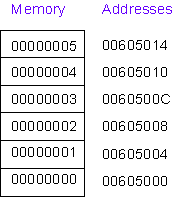Answer:
NO. The first instruction keeps the upper half of $10 the same
and ORs in some bits in the lower half.
The second instruction replaces all 32 bits of $10 with the
zero-extended immediate operand.
ori $10,$10,0x00C4 ori $10,$0, 0x00C4
NO. The first instruction keeps the upper half of $10 the same
and ORs in some bits in the lower half.
The second instruction replaces all 32 bits of $10 with the
zero-extended immediate operand.
ori $10,$10,0x00C4 ori $10,$0, 0x00C4

An
array of int is implemented as a
sequence of words in successive word-aligned memory
locations.
For example, the diagram shows a possible
implementation of:
int data[] = {0, 1, 2, 3, 4, 5};
The above is expressed using the language C, but you don't have to know any C to understand this page. The declaration creates an array of six elements and initializes them to the integers zero through five.
What is the most sensible address to have in the base register for processing this array?